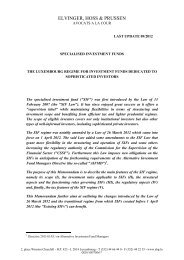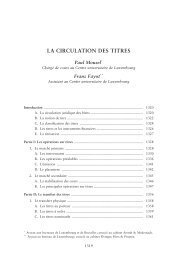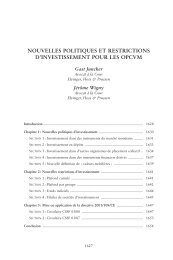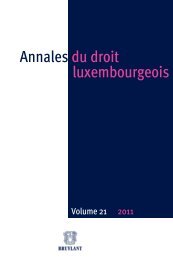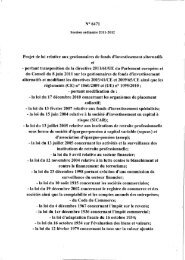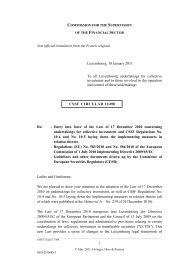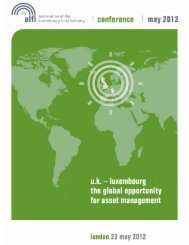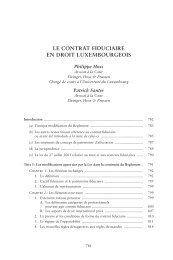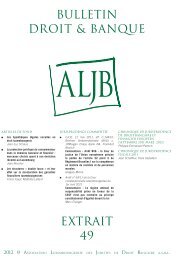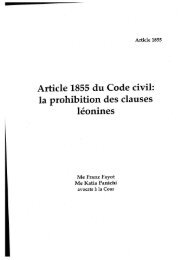1. Introduction - Elvinger, Hoss & Prussen
1. Introduction - Elvinger, Hoss & Prussen
1. Introduction - Elvinger, Hoss & Prussen
- No tags were found...
Create successful ePaper yourself
Turn your PDF publications into a flip-book with our unique Google optimized e-Paper software.
LUXEMBOURGdends representing at least 10 per cent of the share capital of the payor or whichhas an acquisition price of at least 1,200,000 euro.Where the conditions for an exemption of the withholding tax on dividendsprovided for by article 147 LIR do not apply, withholding tax may be reduced byapplicable tax treaties.Non-residents will not be subject to any further tax in respect of dividendsreceived from a Luxembourg corporation unless the shares on which the dividendsare paid are held in a Luxembourg PE of the non-resident.Generally 50 per cent of the dividend received from a fully taxable EU or taxtreaty company by a Luxembourg resident corporation or a Luxembourg PE willbe exempt from income tax.A full exemption of dividend received is available under the dividend substantialparticipation regime provided for by article 166 LIR. The conditions thereofare essentially the same as those provided for in respect of the capital gainsexemption (see section 2.2.1) except that the minimum threshold by reference tothe acquisition price amounts to 1,200,000 euro for the dividend substantial participationexemption instead of 6,000,000 euro for the capital gains substantialparticipation exemption.Article 166 LIR provides for a restriction to the dividend exemption in case ofdividends paid on a qualifying participation received in exchange for a non-qualifyingparticipation. This limitation only applies during the first five years followingthe exchange. For exempt dividend income, financing and operating costswhich are in a direct relationship to such income and any loss on the exempt participationas a result of a write-down after an exempt dividend distribution willnot be tax deductible.2.12. Anti-avoidance rulesThere is no specific Luxembourg legislation dealing with tax avoidance in thecontext of cross-border acquisitions of businesses. The provisions of Luxembourgtax law allowing an exemption or deferral of capital gains contain provisionsthat are generally designed to allow the tax administration to recapture adeferred or exempted gain if the conditions therefor no longer exist, or if costsand expenses in connection with exempt income or gains have enabled a taxpayerto reduce its taxable basis. Tax legislation also intends to capture any gainwhich has been previously exempted or deferred if the right to taxation leavesLuxembourg. These provisions have been referred to above in the descriptions ofthe limitations to the substantial participation exemption on capital gains anddividends in sections 2.2.1 and 2.11 and in sections 2.3.4, 2.3.5 and 2.3.6.In addition, the Luxembourg tax administration has, on the basis of §5 Steueranpassungsgesetz,the right to requalify a legal situation or transactions wherethese constitute an abuse of law. This rule may in particular apply in the case ofthinly capitalised companies and non-arm’s length transactions They may, forinstance, result in the refusal to recognise the deduction of interest on shareholderloans where the appropriate customary debt–equity ratios have not beencomplied with.Further developments on the application of abuse of law can be found in theLuxembourg branch report to the IFA 2001 San Francisco Congress.452



